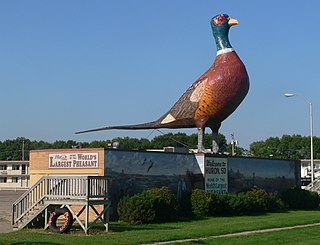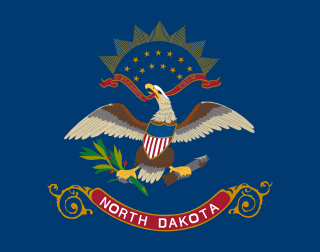Related Research Articles

Huron is a city in Beadle County, South Dakota, United States. It is the county seat of Beadle County. The population was 14,263 at the 2020 census, and it is the 8th most populous city in South Dakota.

The North Dakota Republican Party is the North Dakota affiliate of the United States Republican Party.

The state and local elections in North Dakota in 2006 proceeded as follows:
The North Dakota Public Service Commission is a constitutional agency that maintains various degrees of statutory authority over utilities, telecommunications, railroads, grain elevators, pipeline safety, and other functions in North Dakota.
Susan Wefald is a former North Dakota Republican Party politician. She served as a North Dakota Public Service Commissioner from 1993 until her retirement in 2009.

Sarah Vogel is a North Dakota farm advocate, author, former politician, and lawyer who served as the North Dakota Commissioner of Agriculture from 1989 to 1997. As a lawyer, she specialized in agricultural law.
Tony Clark is a North Dakota Republican politician who served as a Public Service Commissioner from 2001 until 2012 when he was appointed to the Federal Energy Regulatory Commission.

The politics of North Dakota were shaped historically by early settlement by people from the Northern Tier, who carried their politics west ultimately from New England, upstate New York, and the Upper Midwest. The area and state also received numerous European immigrants and migrants, particularly during the era of opening up of former Native American lands for sale and settlement.

The North Dakota State Cabinet is part of the executive branch of the Government of the U.S. state of North Dakota, consisting of the appointed heads of the North Dakota state executive departments. The State Cabinet has evolved into a major part of the State government.
The North Dakota Board of Railroad Commissioners was a North Dakota constitutional agency that was the precedent of the North Dakota Public Service Commission. The Commission consisted of three elected Railroad Commissioners, and was created in 1889. In 1940, in response to the commission's expanding duties beyond the railroad industry, it was renamed the North Dakota Public Service Commission.
The following table indicates the party of elected officials in the U.S. state of North Dakota:

The 2012 United States House of Representatives election in North Dakota was held on Tuesday, November 6, 2012 to elect the U.S. representative from the state's at-large congressional district. The election coincided with the elections of other federal and state offices, including a quadrennial presidential election and an election to the U.S. Senate. A primary election was held on June 12, 2012; a candidate must receive at least 300 votes to appear on the general election ballot in November.

A general election was held in the U.S. state of North Dakota on November 4, 2014. Five of North Dakota's executive officers were up for election as well as the state's at-large seat in the United States House of Representatives. Primary elections were held on June 10, 2014.
The Sandpiper pipeline was a proposed 616-mile-long (991 km) underground oil pipeline project in the United States. It would have carried light crude oil from the Bakken oil fields in Northwest North Dakota, through Minnesota, to Superior, Wisconsin.

North Dakota held two statewide elections in 2016: a primary election on Tuesday, June 14, and a general election on Tuesday, November 8. In addition, each township elected officers on Tuesday, March 15, and each school district selected a date between April 1 and June 30 to hold their elections. This would have been the first election since the state legislature revoked the ability to use a student or military ID to satisfy state ID voting requirements, but a court ruling in August struck the down the provision, and the election was held under the 2013 rules.

The state of North Dakota held a series of elections on November 6, 2012. In addition to selecting presidential electors, North Dakotan voters selected one of its two United States Senators and its lone United States Representative, as well as seven statewide executive officers and one Supreme Court Justice. Primary elections were held on June 12, 2012.

Statewide elections in the U.S. state of North Dakota take place every two years. Most executive offices and all legislators are elected to four-year terms, with half the terms expiring on U.S. Presidential election years, and the other half expiring on mid-term election years.

North Dakota held two statewide elections in 2018: a primary election on Tuesday, June 12, and a general election on Tuesday, November 6. In addition, each township elected officers on Tuesday, March 20, and each school district held their elections on a date of their choosing between April 1 and June 30.
Brian Kroshus is an American businessman and politician serving as the Tax Commissioner of North Dakota. He is a former member of the North Dakota Public Service Commission. Kroshus was appointed to both positions by Governor Doug Burgum.

North Dakota held two statewide elections in 2022: a primary election on Tuesday, June 14, and a general election on Tuesday, November 8. In addition, each township elected officers on Tuesday, March 15, and each school district will hold their elections on a date of their choosing between April 1 and June 30.
References
- ↑ ipu research note [May 31, 2007] Archived March 4, 2016, at the Wayback Machine